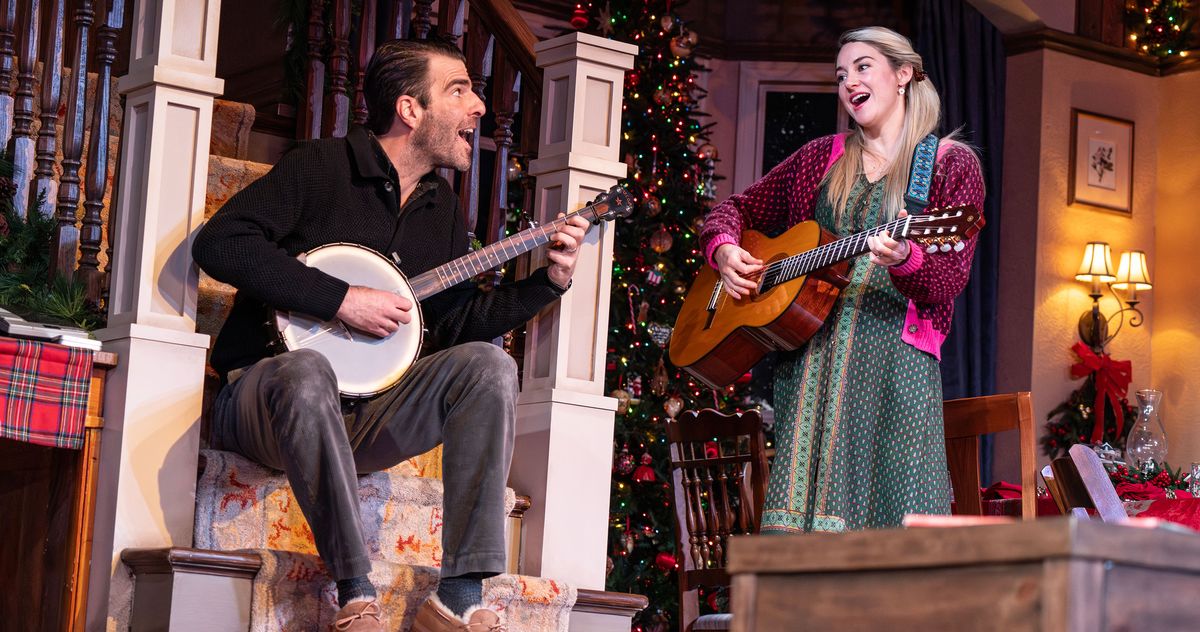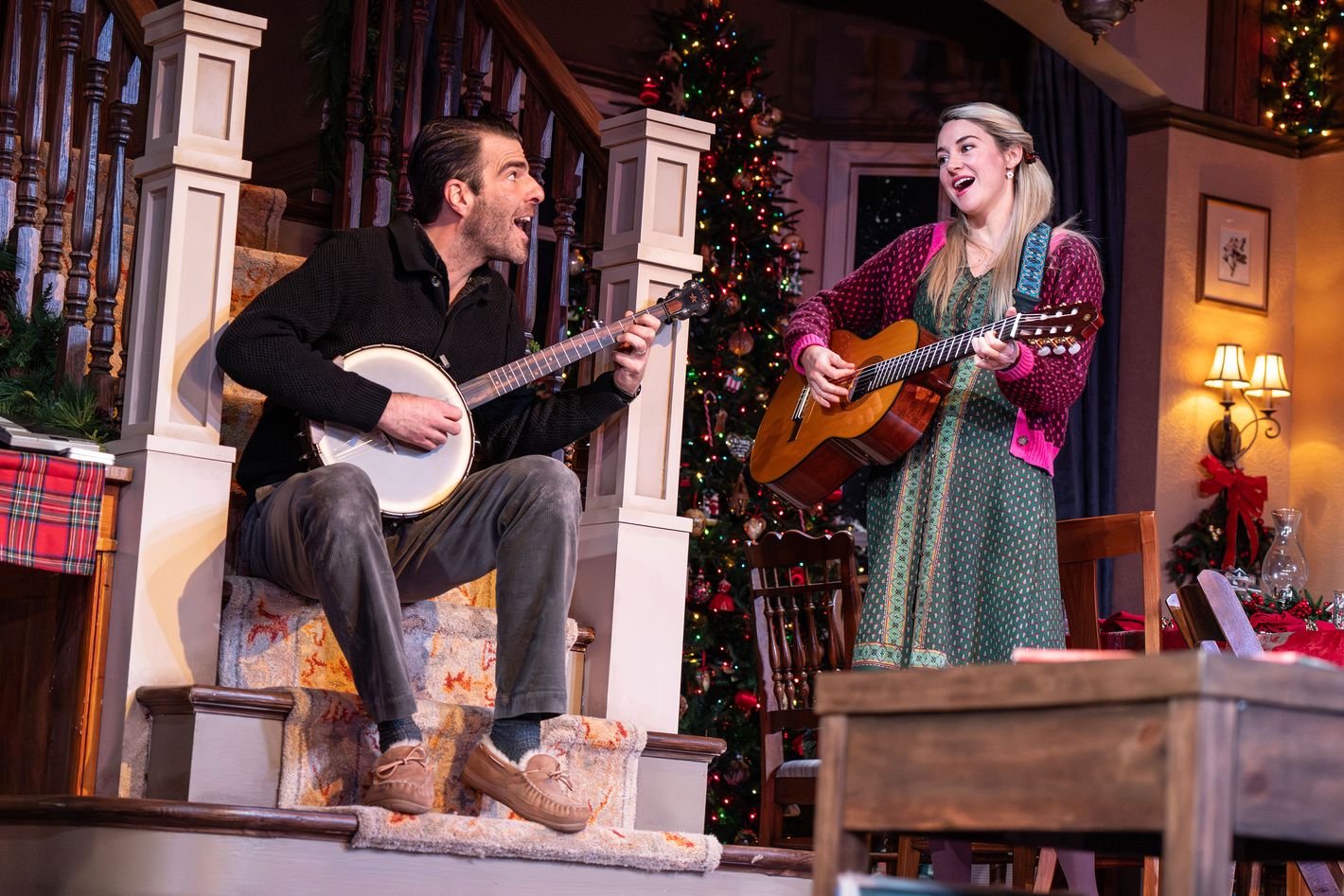Praise God and Pass the Banjo: Cult of Love
Strains (musical and otherwise) within an American Christian family.


It’s often said that singing, in a musical, allows characters to express the buried emotions they can’t quite put into speech. In Cult of Love, it’s the opposite: For the adult children of the Dahl family returning home for a very fraught Christmas dinner, singing together is repression, as they accede to the whims of their extremely controlling parents. While the drinks flow and everyone waits for dinner, the kids bicker with one other, their in-laws, and their parents, and just when you might expect things to fall apart, they break instead into hymns, spirituals, Fleet Foxes, and Sufjan Stevens—pretty much any music, as long as it’s at least tangentially Christian. The Dahls have instruments hidden all over their living room, so much so that it becomes a recurring gag whenever someone pulls a new percussion accessory from behind a couch. You might expect that those songs let those characters vent their accumulated anger, but as in a lot of Leslye Headland’s drama, what is typically cathartic becomes instead coercive. Music, family, love: These things don’t free her characters but force them into submission.
John Lee Beatty’s set clues you in early to the oppressively cozy vein that Headland and the director, Trip Cullman, are mining: We’re inside a Connecticut farmhouse so overdecorated it speeds past Martha Stewart to land on the eerie side of Thomas Kincade. You can see the lights of a Christmas tree through the scrim, which, once it rises, reveals an abundance of knickknacks scattered throughout the living room, as well as fake snow drifting softly outside the frosted window panes. To the matriarch, Ginny (Mare Winningham), and her husband, Bill (David Rasche), things are all as they should be. To their daughter Evie (Rebecca Henderson) and her wife, Pippa (Roberta Colindrez), parachuting in from a cooler and queerer life in the city, it’s all more than a little exhausting. The same goes for her peacemaking older brother, Mark (Zachary Quinto), and especially his wife, Rachel (Molly Bernard), who’s converted from Judaism for him, who makes it very clear after a few drinks that their relationship is on the rocks. The pregnant youngest daughter Diana (Shailene Woodley) is still very much the baby of the family, and still the most religious, her passion for God having turned into zealotry with the encouragement of her husband, James (Chris Lowell), a priest who also awkwardly tries to elbow his way into the family’s musical performances. We’re in the realm of a sturdy reunion drama, down to that last crucial touch: For the first scene, everyone’s waiting around for the prodigal younger son, Johnny (Christopher Sears), an addict in recovery who eventually brings both chaos and his sponsor, Loren (Barbie Feirrera).
As a playwright, Headland tends toward snappy dialogue and debaucherous behavior, the former well on display here, while the latter stays, perhaps appropriately for the Dahls’ sensibilities, offstage. As Branden Jacobs-Jenkins did with last season’s Appropriate, also a Second Stage production in the same space with the same kind of TV-star-heavy cast, you can feel her stepping up to tackle a Big Serious Drama and trying to figure out just how far she can bend the expected tropes toward her own interests. Cult of Love, subtitled “Pride,” marks the last in her series of plays about the Seven Deadly Sins, including Assistance (greed), about working for a mercurial boss, and Bachelorette (gluttony) which covered the coke bender of a trio of frenemies and became a film. You may also be familiar with her TV work, running the first season of Russian Doll or exploring the temptation of the dark side. The more staid setting, here, may seem outside her dramatic comfort zone, though Headland was raised in a strict Christian family. It’s easy to watch the play and get the impression that Henderson, a Headland regular who is also her wife, is playing her dramatic avatar: a woman whose queerness has put her at odds with her parents’ beliefs, but who can’t resist joining in on the singalongs. Cult of Love has a lot of dramatic relatives, including charged family gatherings like Cat on a Hot Tin Roof and the singing sisters of The Hills of California across the street, but the homophone in the “Dahl” name inevitably invokes Ibsen. For her own sanity, Evie ought to take a cue from Nora and just walk out of the play and cut these people out of her life. The brutal thing becomes that she can’t bring herself to.
The same goes for two of the other three Dahl children. Mark got all the way through divinity school, then gave up his faith and became a lawyer, but can’t resist the opportunity to sermonize when given the chance. Johnny is, falteringly, putting his trust in a different higher power in recovery, though as something of the golden child—he was once a chess prodigy—he still performs eagerly for his parents’ pleasure. Sears, once he arrives, gives the play a bolt of energy as he bounds around the stage. Though Cullman has brought everyone up to a remarkably quick pace on Headland’s intercutting dialogue, the decision to stuff this cast with familiar names has mixed results. Quinto’s beleaguered energy works well for Mark, though he struggles to convey the full weight of his struggles with faith, a thread that becomes more crucial in the back third of the drama. Winningham, as the reigning matriarch, underplays her authority to great success, moving as quietly and sweetly as Mrs. Claus, if she handed out poisonous candy canes. The biggest punchline in the show may be when she says “Molestation” out of the blue, answering a question asked several minutes earlier about why she didn’t let her kids go on sleepovers. Rasche, somewhat challenging his Succession corporate-hanger-on image, opts for a genial warmth that obscures emotional absence. He’s also experiencing mental decline, something Evie wants her siblings to help address but that his wife prefers everyone to ignore. While many of the family squabbles do eventually combust, Headland seems to acquiesce here and treads a little too delicately.
The gunpowder is saved for the fighting about religion. Woodley and Lowell are less comfortable onstage to begin with, and they’re playing the resident extremists (with the meta element of wondering about the actress’s own opinions), though it may also be that Headland herself, having left that world behind, doesn’t have a lot of empathy to spare for their homophobic and apocalyptic take on faith. They’re outshone by the non-believers played Henderson, Colindrez (who between this, Fun Home, and Vida, rules the niche of the too-good-to-be-true queer partner), and Bernard, all comfortably at home in wounded sarcasm of Headland’s dialogue and armed the best ripostes. Given a godless New York non-profit theater crowd, already on edge after the latest election and perhaps bracing for their own trips home for the holidays, the heathens tend to get roars of applause when they rebut the Christians around them. Yet as Cult of Love speeds its characters into the night—the play compresses a three-act structure into an intermissionless, and sometimes breathless, hour and forty-five minutes—Headland scrambles the arguments. We learn more about the Dahl kids’ intensely cloistered upbringings, about the ways their parents ignored Diana’s instability, and how they all looked out for each other in that absence. Faith and familial love, for these characters, are both a reflex and a crutch. Ferreira, graduating from Euphoria, isn’t steady yet onstage, but through the arrival of her sponsor, Headland draws a parallel between that need for togetherness and addiction. “What was your first drug?” Mark asks Loren in a quiet late-night tête-à-tête that haunts the play. “My mother,” she says. “I never wanted to leave her side.”
From that vantage, those sing-alongs are all the more chilling, like watching people take hits of drugs they know they can’t resist. The same goes, perhaps, for the structures of a big family drama, which Headland makes seem awfully restrictive and unsettling by the time her dénouement arrives. I don’t think it’s a spoiler to say that you’ll hear some singing again, and that you’ll really wish you hadn’t—and not because it’s not lovely. The actors, under Jacinth Greywoode’s music supervisor, achieve tight vocal harmony. But by that point, harmony itself looks like a very dangerous thing to chase.
Cult of Love is at the Hayes Theater.
Related








